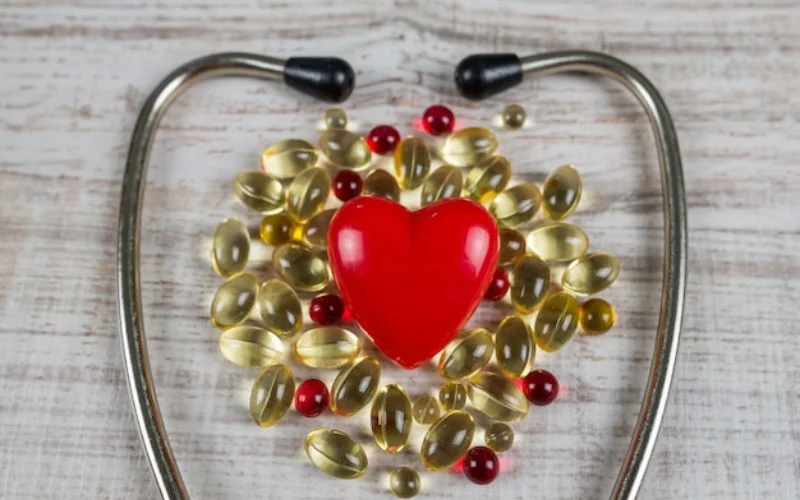You’re at your doctor’s office for a routine check-up, and the conversation shifts to heart health. Your doctor reassures you that your numbers are okay but reminds you there’s always room for improvement. You leave feeling a mix of relief and uncertainty, wondering what more you could do to support your heart. Later that day, as you scroll through your social media feed, a headline catches your eye: “Is Krill Oil Good for Your Heart?”
You’ve heard all about fish oil, but krill oil? That’s new territory. Intrigued, you start reading and discover that this lesser-known oil, extracted from tiny Antarctic krill, is packed with omega-3s that support heart health in surprising ways. As you uncover its benefits, you can’t help but wonder: could krill oil be the simple, natural boost your heart has been missing?
In this article, we’ll dive into how krill oil can support your heart, why it’s becoming a go-to supplement, and how it stacks up against other popular options. Whether you’re ready to take proactive steps for your heart or simply curious about this trending supplement, this guide has you covered. Let’s get started!
Understanding Krill Oil: What Is It?
Krill oil is a dietary supplement derived from tiny, shrimp-like marine crustaceans known as krill, predominantly found in the icy waters of the Antarctic. Krill oil is extracted directly from these crustaceans. It is prized for its rich content of omega-3 fatty acids, primarily eicosapentaenoic acid (EPA) and docosahexaenoic acid (DHA), similar to those found in fish oil.
Krill oil stands out from other omega-3 sources due to its unique structure; it contains phospholipids instead of the triglycerides found in fish oil. This phospholipid form makes krill oil more efficient and bioavailable, allowing your body to absorb omega-3s more effectively. By integrating omega-3s directly into cell membranes, phospholipids enhance cellular function and provide superior support for heart health.
Is Krill Oil Good for Your Heart?
Absolutely! Krill oil is a heart-healthy supplement packed with omega-3 fatty acids like EPA and DHA, essential for maintaining cardiovascular health. Unlike fish oil, krill oil’s omega-3s are bound to phospholipids, making them more easily absorbed, so your body gets the most out of every dose. This bioavailability gives Krill oil an edge, delivering heart benefits more efficiently.
Krill oil’s omega-3s are powerful allies. They help lower triglycerides—fats that can clog arteries—while boosting good cholesterol (HDL). They also help relax blood vessels, improve blood flow, and reduce the risk of heart attacks and strokes.
Adding to its benefits, krill oil contains astaxanthin, a potent antioxidant that shields heart cells from damage and inflammation, keeping your heart running like a well-oiled machine. Studies have shown that krill oil can significantly reduce inflammation and improve cholesterol levels, providing your heart with the support it needs.
If you’re looking for a natural way to support your heart, adding krill oil to your routine is an easy step toward better heart health.
Why Omega-3s Are Crucial for Heart Health
The human body needs omega-3 fatty acids essential fats that it can’t produce on its own making it necessary to get them from food or supplements. For heart health, two of the most vital omega-3 types are EPA (eicosapentaenoic acid) and DHA (docosahexaenoic acid), richly in krill oil. These omega-3s work quietly behind the scenes, supporting heart and blood vessel health and helping to keep your cardiovascular system running smoothly.
- Reduce inflammation: Long-term inflammation is a major cause of heart disease because it leads to atherosclerosis and plaque buildup in the arteries. Omega-3s help reduce this inflammation, keeping your arteries clear and improving overall heart function.
- Lowering Triglycerides: High levels of triglycerides fats in your blood can increase the risk of heart disease. Omega-3s help lower triglyceride levels, acting as a natural way to reduce harmful fats that clog your arteries.
- Regulating Blood Pressure: Omega-3s can help relax and widen blood vessels, making blood flow easier and reducing high blood pressure a leading risk factor for heart attacks and strokes.
- Improving Cholesterol Levels: While bad cholesterol (LDL) clogs your arteries, good cholesterol (HDL) helps clear it away. Omega-3s have been shown to increase HDL cholesterol, giving your heart a better defense against plaque buildup.
- Preventing Blood Clots: Omega-3s help keep your blood flowing smoothly by preventing platelets from clumping together, which reduces the risk of dangerous blood clots that can lead to heart attacks.
In essence, omega-3s work as a protective shield for your heart, tackling several risk factors simultaneously. By including omega-3-rich foods or supplements like krill oil in your diet, you’re making a proactive choice to keep your heart healthy and resilient against the everyday challenges it faces.
Krill Oil vs. Fish Oil: Which Is Better for Your Heart?
If you’ve ever browsed the supplement aisle, you’ve probably faced the fish oil vs. krill oil debate. Both promise heart health, but which is really better? Let’s break it down simply so you can make the best choice for your heart.
Absorption Rates: The Fast Track Advantage
Imagine your body as a sponge trying to soak up all the good stuff from your supplements. Krill oil has a transparent edge here its omega-3s are bound to phospholipids, making them easier for your body to absorb, like water on a thirsty sponge. Fish oil, on the other hand, delivers omega-3s in triglyceride form, which takes longer for your body to break down and use. This means with krill oil, you get faster and more efficient benefits.
Effectiveness: More Than Just Omega-3s
Both krill oil and fish oil are packed with heart-friendly omega-3s, but krill oil offers a little extra with astaxanthin, a potent antioxidant that helps fight inflammation and protect heart cells. Fish oil doesn’t naturally have this antioxidant punch, leaving krill oil one step ahead in providing comprehensive heart protection.
Additional Benefits: Purity and Peace of Mind
Worried about contaminants? Krill oil generally contains lower mercury levels and other toxins than fish oil because krill is lower on the food chain. This makes krill oil a cleaner, safer option for those concerned about the purity of their supplements.
Which Should You Choose?
While both oils offer heart health benefits, krill oil’s superior absorption, added antioxidant protection and lower contaminant levels make it a standout choice. It’s like choosing a luxury ride for your heart faster, safer, and more comfortable.
Who Should Consider Taking Krill Oil for Heart Health?
Krill oil isn’t just another supplement; it’s a game-changer for those looking to give their heart a little extra love. But who stands to gain the most from adding krill oil to their daily routine? Let’s dive in.
1. People with High Cholesterol:
If you’ve been told your cholesterol levels are a bit high, krill oil might be just what the doctor ordered literally. The omega-3s in krill oil help reduce bad cholesterol (LDL) and boost good cholesterol (HDL), making it a natural ally in your fight for healthier numbers.
2. Battling High Blood Pressure:
High blood pressure strains your heart, increasing the risk of heart disease. Omega-3s in krill oil help relax blood vessels, easing blood flow and helping keep that pressure in check. It’s like giving your heart a much-needed break.
3. Family History of Heart Disease:
Genetics can play a big role in heart health, and if heart disease runs in your family, krill oil can be a proactive step to safeguard your heart. Its anti-inflammatory properties and ability to improve overall cardiovascular function make it a smart choice for those with a family history of heart issues.
4. People Dealing with Inflammation:
Inflammation is often called the silent killer because it can quietly contribute to heart disease. Krill oil’s natural antioxidant, astaxanthin, acts as a powerful defense, helping to calm inflammation and protect your heart from damage.
5. Anyone Looking to Support Overall Heart Health:
Even if you don’t have specific risk factors, krill oil is a great addition to your wellness routine. Think of it as routine maintenance for your heart helping to keep things running smoothly and efficiently.
Before starting krill oil or any new supplement, it’s always wise to chat with your healthcare provider, especially if you’re on medications or have underlying health conditions. They can help ensure it’s the right fit for you.
Potential Side Effects and precautions
While krill oil offers numerous heart health benefits, it’s essential to be aware of potential side effects and interactions, especially if you’re taking medications. Here’s what you need to know to stay safe and maximize your krill oil supplement.
Potential Side Effects
Krill oil is generally well-tolerated, but some people may experience mild side effects like stomach discomfort, bloating, or a fishy aftertaste. These symptoms are usually temporary and can be minimized by taking the supplement with food.
Interactions with Medications
If you’re taking blood thinners like warfarin or aspirin, exercise caution. Krill oil has blood-thinning properties that can enhance the effects of these medications, potentially increasing the risk of bleeding. Always consult your doctor before adding krill oil to your routine, especially if you manage conditions with medication.
Precautions for Allergies and Sensitivities
If you have a shellfish allergy, you should avoid krill oil, as it is derived from marine crustaceans. Additionally, those with a history of seafood allergies should consult their healthcare provider before starting.
What to Look For When Buying Krill Oil
- Purity and Sourcing: Choose krill oil that is sustainably sourced, ideally certified by the Marine Stewardship Council (MSC). This certification ensures the krill are harvested responsibly, protecting ocean ecosystems.
- Check the Label: Look for supplements with phospholipid and astaxanthin content, which indicates a high-quality product. Avoid supplements with unnecessary fillers or artificial additives.
- Third-Party Testing: Opt for krill oil that has been independently tested for contaminants like heavy metals and PCBs. This adds a layer of safety, ensuring you get a clean, effective product.
Storage Tips: To preserve its potency, keep krill oil in a cool, dark place. Heat and light can degrade the oil, reducing its effectiveness.
Conclusion
Incorporating krill oil into your daily routine is a simple yet effective way to support heart health naturally. Packed with highly absorbable omega-3s, krill oil goes beyond traditional supplements by offering enhanced cardiovascular benefits thanks to its unique phospholipid structure and the powerful antioxidant astaxanthin. From lowering triglycerides and improving cholesterol levels to reducing inflammation and supporting overall heart function, krill oil provides a comprehensive approach to keeping your heart in great shape.
Whether managing high cholesterol, battling high blood pressure, or looking for proactive ways to support your heart, krill oil is a smart, natural choice. So, if you’re asking, “Is krill oil good for your heart?” the answer is a resounding yes. Take a step toward better heart health today by exploring high-quality krill oil supplements that fit your needs.
FAQ
Does Krill Oil Reduce Plaque In Arteries?
Krill oil may help reduce arterial plaque by lowering inflammation and improving cholesterol levels, slowing down plaque buildup in arteries. However, it’s not a direct treatment and works best as part of an overall heart-healthy lifestyle.
Is Krill Oil Better Than Fish Oil For Your Heart?
Krill oil is often better than fish oil for heart health due to its superior absorption, added antioxidant (astaxanthin), and lower contaminant levels. The body more efficiently utilizes its omega-3s, providing enhanced cardiovascular benefits.
Does Krill Oil Raise Ldl?
Krill oil typically improves cholesterol profiles by increasing good HDL cholesterol and lowering triglycerides. It generally doesn’t raise LDL cholesterol significantly and may help improve overall cholesterol balance, but individual responses can vary.
Is 500 Mg Of Krill Oil A Day Enough?
A daily dose of 500 mg of krill oil is generally sufficient to maintain heart health and provide essential omega-3s. However, higher doses might be needed for specific health concerns; consult a healthcare provider for personalized guidance.
Is 1000 Mg Of Krill Oil Too Much?
A dose of 1000 mg of krill oil is generally safe and often recommended for those needing extra support for heart health, high cholesterol, or inflammation. Following dosage guidelines on the product label or consulting a healthcare provider is best.
Can I Take Vitamin D3 With Krill Oil?
Yes, you can take vitamin D3 with krill oil. Both supplements support overall health, and there are no known adverse interactions between them. They work well together to promote heart, bone, and immune system health.
Does Krill Oil Really Help Your Heart?
Yes, krill oil supports heart health by reducing triglycerides, improving cholesterol balance, lowering inflammation, and enhancing blood vessel function. Its unique absorption and antioxidant properties make it a beneficial addition to a heart-healthy regimen.










